Table of contents
There is a reason mustaches are back in style this month. November is Men’s Health Month, coined Movember for the mo’s (moustaches) that men rock in support of the cause. Movember is meant to raise awareness and money for men’s health issues such as testicular cancer, prostate cancer, suicide and mental health. Many of these issues can directly affect a man’s fertility, and a man’s mental health can suffer following years of infertility. This is why we are supporters of Movember and what it is that they stand for and accomplish each November.
Infertility affects around 48.5 million couples all over the world, with the male partner responsible for 20-30% of infertility cases in infertile couples. However, infertility was stigmatized for many years placing the sole responsibility of reproduction on the female partner. This way of thinking has led to the majority of fertility research surrounding women. For example, between the years 1945 to 1985 only 1 out of 121 fertility articles focused on men.
We now know that men are larger contributors to infertility than we once thought and unfortunately, medicine and science surrounding male infertility are still catching up. Knowledge and research surrounding the psychological effects of male infertility are particularly lacking. Thankfully we are learning more and more about male infertility all the time, thanks to initiatives like Movember.
The Social and Psychological Effects of Male Infertility
For decades researchers have focused on a woman's mental health when struggling with infertility, and not a lot surrounding male infertility and depression. Researchers assume that women would be suffering considerably more with their mental health than men. However it is now predicted men do suffer the psychological toll of infertility, however, it can present differently than in women.
Older studies stated that almost half of women considered infertility one of the most upsetting experiences of their lives. With only about 15% of men considering it the most upsetting experience of their lives. These numbers were from an American study but this research might now be based on outdated gender stereotypes and inadequate methodology.
The way a lot of men responded and reacted to dealing with infertility was to suppress their emotions, adhering to society’s masculinity norms. Insert the male stoic partner. Many of these men would withdraw in order to protect themselves as well as their female partners from pain. Whereas women would voice their sadness and need to talk about it often and openly. Jaffe and Diamond, 2010 believe while women were grieving the loss, the man was feeling the need to rewrite the reproductive story in order to restore meaning and hope for the future.
According to the World Health Organization men are 3.5 times more like to commit suicide compared to women. These feelings of depression and suicidal thoughts stem from societal pressures to handle things on your own. Stay ‘strong’ and not show weakness. “Guys, more times than not, will want to try and present themselves as these big, strong guys that can handle anything that is thrown at them, but internally they are just trying so hard to fight the battles inside,” says Ethan Dietrich, publicity chair for Active Minds.
We are now seeing a man’s infertility depression and psychological well-being scoring as low as women’s in groups that were unsuccessful with IVF. Infertility depression, anxiety and other mental health problems can arise when a man is diagnosed with infertility and treatment become necessary.
Specifically, if a man already experiences anxiety in daily life prior to diagnosis. When diagnosed, many of these men will prefer support from a clinician rather than from mental health professionals or support groups. This reaction might be linked to the feeling of embarrassment. This is a natural feeling for most men. Particularly in cultures where there are social stigmas surrounding a male who is not able to produce offspring.
Studies focusing on the psychological effects of male infertility and infertility depression following IVF and other invasive fertility treatments on infertile men are still missing. We will need more research done to truly and deeply understand male infertility and depression.
Natural Ways To Treat Certain Forms of Male Infertility
There are all sorts of diagnoses a man can receive when dealing with infertility and infertility depression symptoms. This could include a low sperm count, low sperm motility, hormonal imbalances, ejaculation issues, varicoceles, undescended testicles, tumours, celiac disease, chromosome defects, being on certain medications and more.
If you’re just starting out on your fertility journey, or are trying to conceive, we always recommended speaking with your doctor. They can help you eliminate potential issues and test you for any possible health concerns linked to male infertility. Once you have an idea of what you are working with it might become easier to decide your next steps.
If you’re looking to improve the overall health and quality of your sperm you should check our MedFertil for Men. This is an all-natural men’s reproductive health supplement that can help men:
- Improve sperm motility
- Increase overall sperm count
- Enhance DNA integrity
- Reduce damage to cells from free radicals
- Promotes healthy heart and immune system
- And more!
If you’re dealing with hormonal imbalances that are affecting your male fertility you might also try out the MedTesto supplement. This is a testosterone supplement that supports emotional, physical and mental aspects of sexual health in men. This herbal reproductive health supplement is used for:
- Promoting testosterone production in men
- Improves a man’s libido
- Helps enhance sexual capacity and performance
- Reduces mental fatigue and stress
- Supports healthy estrogen metabolism and balance
Natural Reproductive Health Solutions for Couples Facing Infertility
Elan Healthcare creates all-natural reproductive health supplements for both men and women. If you or your partner is struggling with infertility we have all-natural prenatal vitamins and hormone supplements to choose from. Infertility is something many men and women have in common and for thousands, it can be successfully treated.
References:
1 - A unique view on male infertility around the globe. By Agarwal A, Mulgund A, Hamada A, Chyatte MR. Published Apr 2015.
2 - (Male) infertility: what does it mean to men? New evidence from quantitative and qualitative studies. By Wischmann T, Thorn P. Published June 2013.
3 - Reproductive trauma: Psychotherapy with infertility and pregnancy loss clients. By Jaffe, J., & Diamond, M. O. Published 2011.
4 - Movember and Men’s Health Awareness Month. By, Miller A, Kurtzhals A. Published November 2021.
5 - Gender perspective on quality of life, comparisons between groups 4-5.5 years after unsuccessful or successful IVF treatment. By Johansson M, Adolfsson A, Berg M, Francis J, Hogström L, Janson PO, Sogn J, Hellström AL. Published May 2010.






















No comments yet.
There are no comments for this article. Be the first one to leave a message!
+ Open to leave a Comment